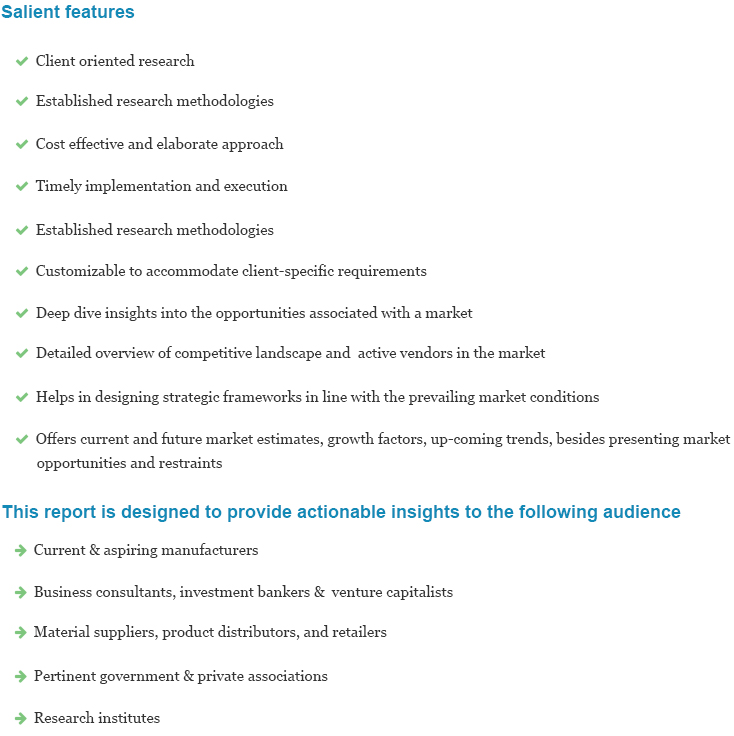
Farnesene Market Size By Application (Cosmetics & Personal Care, Performance Material, Flavours& Fragrances, Fuels & Lubes), Industry Analysis Report, Regional Outlook, Competitive Market Share & Forecast, 2016 - 2024
- Published: July, 2016
- Format: Electronic (PDF)
- Number of pages: 75
- Industry: Renewable Energy
The global farnesene industry size is expected to increase significantly over the next seven years on account of growing usage in cosmetics, perfumes, detergents, industrial lubricants and transportation fuels. Increasing emission control norms and usage of biofuels in the automobile and aviation sector is expected to promote the industry growth. Moreover, the usage of farnesene in products such as diesel, jet fuel, cosmetics, perfumes, detergents, lubricants, polymers and plastic additives is anticipated to drive the demand for the industry.
Use of farnesene-based jet fuel and renewable diesel is likely to be cost efficient, which will boost its usage as a replacement for synthetic fuels to lower greenhouse gas emissions. Farnesene occurs naturally in many plants as well as in fruits such as lime, apple, mandarin, orange and grapefruit and is anticipated to promote the industry growth over the next seven years.
Farnesene is used extensively in the cosmetic and perfume industry due to its pleasing odor and is expected to drive the market growth in the upcoming years. Farnesene is used as an ingredient in moisturizing and anti-ageing cream formulations and is likely to witness industry growth owing to the boost in cosmetic and personal care product industry. The product finds its use in many food applications in light of its good flavor is likely to increase its demand in future. The flavor attribute makes it an excellent supplement in teas and juices and is likely to augment its demand. Other applications of farnesene are in adhesives, surfactants, stabilizers, oligomers, polymers, fragrances, resins, foams, coatings, sealants, emulsifiers, vitamin precursors, and crop protection is expected to drive the demand of the industry.
Alternative biofuels such as fatty acids and hydrogenated esters based on biomass find its application in the aviation sector, proves to be the primary challenge for industry growth. Deviation in the major feedstock harvest, on account of unfavorable weather conditions, is expected to be a restraint for the industry growth. However, increased investments in R&D and innovation are supposed to create immense potential for the industry growth.
By application, farnesene market is segmented into cosmetics & personal care, performance material, flavors& fragrances, fuels & lubes and others (vitamin precursors, emulsifiers, surfactants, and stabilizers). Cosmetic & personal care application dominated the demand for the product in 2015 and are expected to witness significant growth over the next seven years. Performance material application includes usage of farnesene in improving performance and shape stability of rubber tire and is projected to see market growth owing to the growth in automotive and aviation tire industry.
Europe dominated the market on account of growing cosmetic and personal care industry and is expected to increase significantly over the upcoming years. Performance material industry is projected to witness substantial market growth on account of growing automotive and aviation industry in Europe.
Asia Pacific is anticipated to see significant market growth owing to the increasing per capita income coupled with the existence of extensive chemical, automobile, aviation, and cosmetic & personal care industries.
North America is expected to witness substantial growth on account of rapidly growing automobile, aerospace, and personal care industry in the upcoming years.
Latin America will show growth owing to favorable weather conditions to harvest sugarcane crops round the year in Brazil.
Global farnesene industry is currently lead by Amyris. IFF, Total, and Kuraray have collaborated with Amyris to design target molecule for applications such as fragrances, biojet fuels, and polymers.
Chromatin and Intrexon are currently in emerging stage for achieving commercial production level. Intrexon has successfully performed lab scale production route using methane bioconversion. Chromatin through gene stacking method has developed sorghum plant with elevated product level.
Amyris Inc. announced a record low manufacturing cost of USD 1.75 per liter for farnesene in 2015. Amyris has focused its business on the formation of inventive ingredients that serve as replacements for other materials that are financially and costly and environmentally are subject to volatile supply issues.

Choose License Type
- World's largest premium report database
- Transparent pre & post sale customer engagement model
- Unparalleled flexibility in terms of rendering services
- Safe & secure web experience
- 24*5 Research support service
